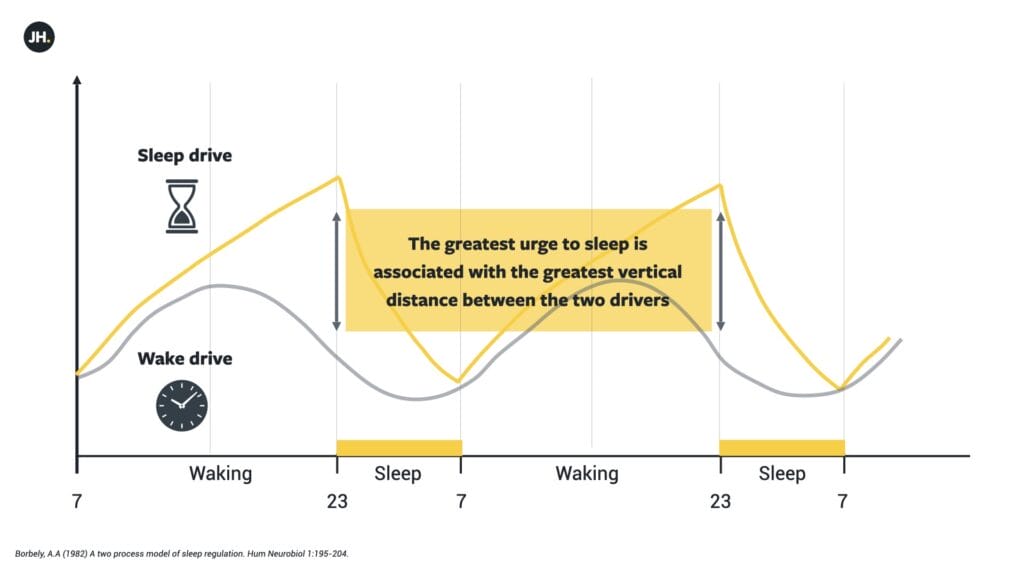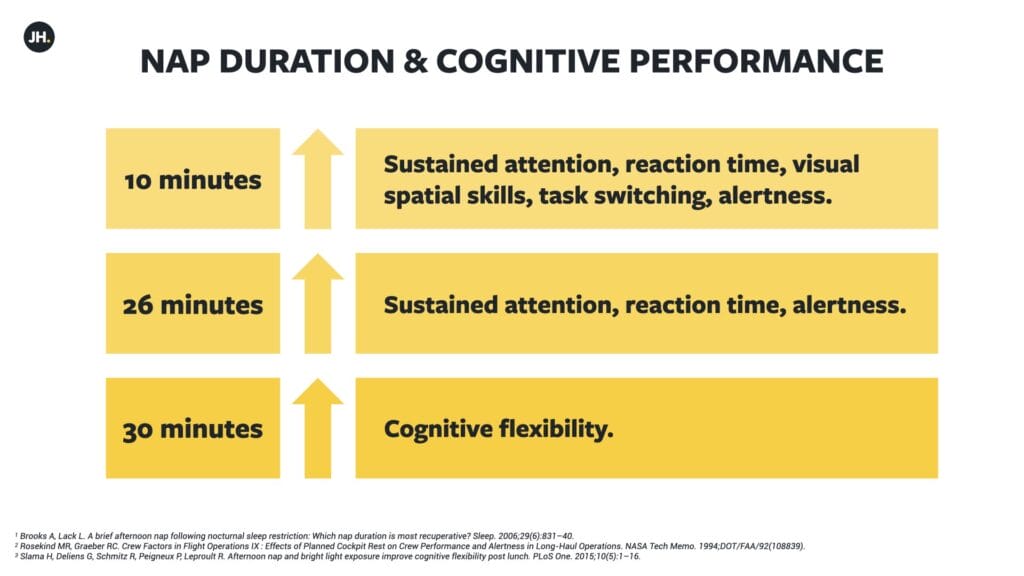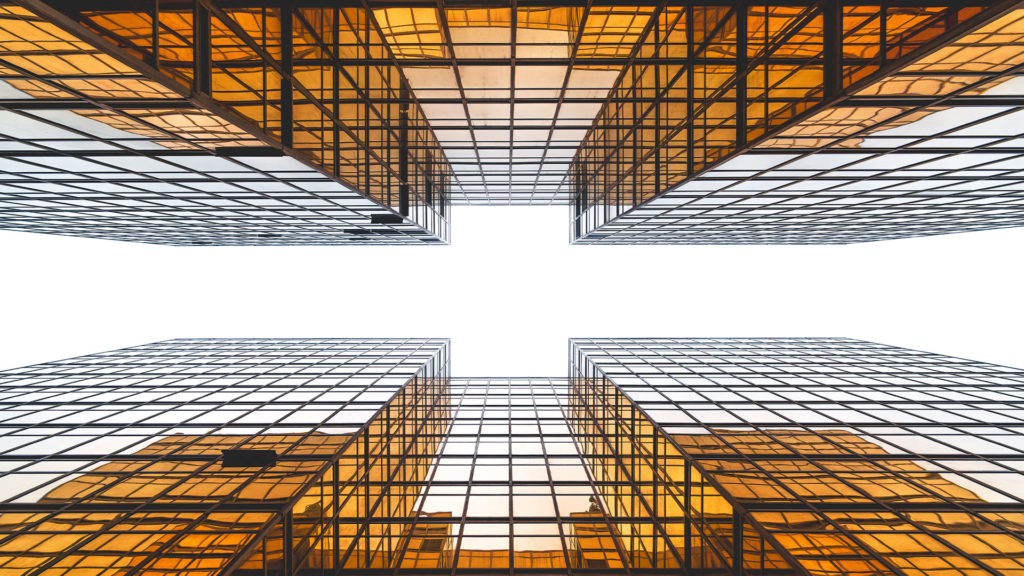From pilots to military personal, busy businesspeople to tired parents, tactical naps are a proven, powerful way to boost cognitive performance; an important consideration in light of findings that performance impairments are equivalent to being drunk, after 18 hours of being awake. Read on to discover more about the science of napping, and the optimal nap durations to improve cognitive and physical performance.
The Nap Sceptic
I admit, when I first heard about the rise of ‘napping rooms’ and ‘energy pods’ in the offices of West Coast technology companies, about ten years ago, I was sceptical. Sneaking off for a snooze in the afternoon seemed… well… like a sign of weakness. Don’t get me wrong, I knew a lot of people who took naps, it’s just that they were either under the age of five or in care homes for the elderly. However, my thinking and perspectives have evolved considerably over the last decade, and my view on napping has transformed completely.
Patterns Of Sleep & Wakefulness
Our patterns of sleeping and wakefulness, as well as alertness, are governed by two interactive processes. You can imagine one process as a chronometer – your body clock – which completes a cycle approximately once every 24 hours. You can imagine the other process as more like an hour-glass timer, that works as a ‘metabolic meter’. The hour-glass ‘fills up with sleep-pressure’ while we are awake and ‘empties’ while we sleep. The longer we are awake, the higher the sleep pressure. This increased pressure, coupled with the later phase in the circadian rhythm, combine to make us feel sleepier and less alert.

Sleepiness Is As Detrimental To Performance As Being Drunk
The longer we stay awake, the worse our performance, thanks to the combined effect of the later phases in our circadian rhythm and increasing sleep pressure. After being awake for 17–19 hours, corresponding to between 2230 and 0100 at night, your reaction time will be 50% slower with worse accuracy than you would exhibit with a blood alcohol concentration high enough to be arrested for drink-driving1.
Even if we are well-rested, our cognitive performance will still decrease considerably by the end of the day. The impairment is likely to be even worse when the previous night of sleep was shortened. However, even a short nap can provide a substantial and relatively long-lasting boost to our cognitive performance.
Different Types Of Nap
Naps can be divided into three categories
- Planned napping: This is a nap that you take before you feel sleepy, so you will stay alert for longer, if you know that you will be staying up later than usual, for example.
- Emergency napping: A nap taken when you suddenly feel so tired that you can not safely or adequately continue with whatever you are doing. For example, if someone feels tired while driving, they may quickly find a safe place to stop the vehicle and take a nap.
- Habitual napping: When you take a nap at the same time each day. This is common among children, who often take an afternoon nap, but some adults also have a daily napping routine, such as post-lunch snooze or siesta.
Taking a nap is like flipping over the hour-glass. As you sleep, the timer runs in the opposite direction, and sleep pressure reduces.
Napping Benefits (And How Long They Last For)
Numerous studies report that naps are associated with several positive outcomes.
- 10-minute nap: can result in immediate improvements in cognitive performance, energy and reduced feelings of fatigue and sleepiness, with benefits maintained for as long as 155 minutes3.
- 20-minute nap: improves endurance performance, in terms of longer time to exhaustion, and lower rating of perceived exertion, in athletes who slept for less than 7 hours4.
- 26-minute nap: may improve subsequent task performance by 34% and alertness by 50%, for several hours2.
- 30-minute nap: taken post-lunch, was associated with improved cognitive flexibility5.
- 45-minute nap: appeared to be most effective for improving performance and reducing fatigue during a high-intensity exercise session, featuring repeated efforts, 2-2.5 hours after the end of the nap6.

Unfortunately, napping may also be associated with some adverse outcomes. In particular, a nap lasting for more than 10-20 minutes may be associated with a greater experience of ‘sleep inertia’; the tired feeling after you wake up. The more sleep deprived you are before the nap, and the longer the duration of the nap, the higher the sleep inertia is likely to be. Also, a long nap, or nap that begins later in the day, may interfere with sleep at night.
There are several steps that you can take to enjoy the performance-enhancing benefits of a nap while minimising sleep inertia. The first is to limit nap duration. A 2006 study compared the benefits of naps which were made up of precisely 5, 10, 20, and 30 minutes of sleep, relative to not taking a nap. In terms of maximising the performance-enhancing benefits, while minimising post-nap drowsiness, a 10-minute nap was the most effective.
Nappuccino To The Rescue
Several studies have investigated the impact of combining caffeine with napping; sometimes called a ‘nappuccino’. This cocktail takes advantage of the fact that caffeine takes about 30 minutes to reach peak levels in our blood plasma. Taking 200mg of caffeine (equivalent to a large (500ml) americano), followed by a 20-minute nap appears, to be an effective means to reduce sleepiness and improve performance (7,8).
What Would The Boss Think?
In an ideal world, we would all be enjoying at least 7 hours of sleep every night, but for many of us, life and work get in the way, at least some of the time. Napping is one the cheapest, most effective means to enhance your cognitive performance and combat sleepiness. The gains in productivity and improved performance, post-nap, could more than compensate for the time spent snoozing.
Are you a regular user of tactical naps to improve your performance? What would you think if your employees, or maybe your boss, took a nap at work? Let me know your experience of napping in the comments.
References
- Williamson AM, Feyer A. Moderate sleep deprivation produces impairments in cognitive and motor performance equivalent to legally prescribed levels of alcohol intoxication. 2000 p. 649–55.
- Rosekind MR, Graeber RC. Crew Factors in Flight Operations IX : Effects of Planned Cockpit Rest on Crew Performance and Alertness in Long-Haul Operations. NASA Tech Memo. 1994;DOT/FAA/92(108839).
- Brooks A, Lack L. A brief afternoon nap following nocturnal sleep restriction: Which nap duration is most recuperative? Sleep. 2006;29(6):831–40.
- Blanchfield AW, Lewis-Jones TM, Wignall JR, Roberts JB, Oliver SJ. The influence of an afternoon nap on the endurance performance of trained runners. Eur J Sport Sci. 2018;18(9):1177–84.
- Slama H, Deliens G, Schmitz R, Peigneux P, Leproult R. Afternoon nap and bright light exposure improve cognitive flexibility post lunch. PLoS One. 2015;10(5):1–16.
- Boukhris O, Abdessalem R, Ammar A, Hsouna H, Trabelsi K, Engel FA, et al. Nap opportunity during the daytime affects performance and perceived exertion in 5-m shuttle run test. Front Physiol. 2019;10(JUN):1–8.
- Hayashi M, Masuda A, Hori T. The alerting effects of caffeine, bright light and face washing after a short daytime nap. Clin Neurophysiol. 2003;114(12):2268–78.
- Reyner LA, Horne JA. Suppression of sleepiness in drivers: Combination of caffeine with a short nap. Psychophysiology. 1997;34:721–5.





